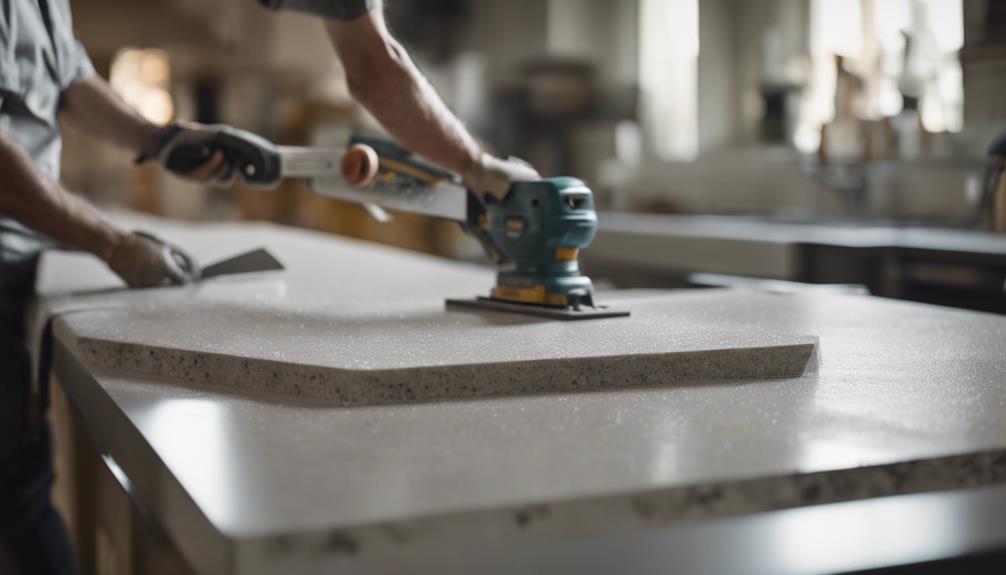The allure of granite countertops in your home is undeniable, a blend of timeless elegance and durability. As an owner, you might be seeking ways to preserve this allure, ensuring that your countertops remain as pristine as the day they were installed. Every stain, crack, or scratch that mars the surface might feel like a costly setback, a threat to the longevity of your investment.
Rest assured, with the right approach, maintenance need not be a daunting task. Leaning on years of experience with granite maintenance, we've compiled a comprehensive set of tips that address your concerns. From selecting the right cleaning products to shielding your countertops against heat and scratches, you'll find actionable advice tailored just for you.
Embark on this journey with us, and discover how simple steps can safeguard your granite surfaces, allowing you to relish the timeless charm of your granite countertops.
Now, let's dive into these essential tips that promise to keep your countertops in top-notch condition for years to come.
Sealing Granite Surfaces
Sealing granite surfaces is an essential step in maintaining the longevity and pristine appearance of your countertops. Properly sealed granite countertops are protected against stains, as the sealant creates a nonporous barrier. To determine if your granite countertops need resealing, perform a simple water test. Splash a few drops of water on the surface and observe if the water beads up. If the water does not bead, it's time to reseal your countertops.
When applying the sealant, ensure that the granite surface is clean and dry. Apply the sealant in a well-ventilated area using a soft cloth or sponge, and follow the manufacturer's instructions for the specific product you are using. It's important to take care when applying the sealant, as any excess product that dries on the surface can be difficult to remove.
In general, granite countertops should be resealed at least once a year to maintain their protective barrier and ensure the continued beauty of the surface. Lighter-colored granite may require more frequent sealing than darker colors due to its more porous nature. Proper care and maintenance of sealed granite surfaces are essential for their long-term durability and aesthetic appeal.
Cleaning Dos and Donts
To maintain the longevity and pristine appearance of your granite countertops, it is crucial to follow proper cleaning dos and don'ts.
When it comes to cleaning your granite countertop, there are several dos to keep in mind. It's essential to blot up spills immediately to prevent stains from setting into the porous surface. For regular cleaning, use a soft cloth or sponge with stone-safe cleaners to avoid damaging the natural stone. Additionally, using coasters for glasses and avoiding placing hot pans directly on the surface will help prevent accidental damage. Using cutting boards is also recommended to prevent scratches on the granite surface.
On the other hand, there are important don'ts to adhere to when cleaning granite countertops. Avoid using generic cleaning products like glass cleaners and bleaches, as well as ammonia, vinegar, or citrus-based cleaners, which can cause etching and dullness. Furthermore, abrasive bathroom cleaners and grout cleaners should be avoided as they can damage the surface. It's crucial not to stand or sit on granite countertops and to refrain from keeping toiletries and liquids directly on the surface.
Polishing Dos and Donts
When it comes to maintaining the luster of your granite countertops, it's important to follow the dos and don'ts of polishing.
Understanding the proper products to use and avoiding harmful substances is crucial for preserving the natural shine of the stone.
Dos for Polishing Granite
Maintaining the natural shine of granite countertops through proper polishing techniques is essential for preserving their integrity and aesthetic appeal. When it comes to polishing granite, there are specific dos that should be followed to ensure the best results. It's important to use granite-safe polishing products and strictly adhere to the manufacturer's instructions for the best outcome. Regular cleaning and maintenance also play a crucial role in retaining the natural shine of granite countertops. Understanding that the shine on granite surfaces is a result of cutting and processing at the quarry is fundamental. Additionally, it is essential to realize that polishing is not achieved through chemically applied substances or cleaning techniques. Finally, it's imperative to avoid using generic cleaning products or acidic substances for polishing.
| Polishing Dos for Granite |
|---|
| Use granite-safe polishing products and follow the manufacturer's instructions. |
| Regular cleaning and maintenance are essential for maintaining the natural shine. |
| Understand that the shine on granite surfaces is a result of cutting and processing at the quarry. |
| Polishing is not achieved through chemically applied substances or cleaning techniques. |
| Avoid using generic cleaning products or acidic substances for polishing. |
Don'ts for Polishing Granite
When undertaking the process of polishing granite, it is paramount to be aware of the specific practices to avoid in order to maintain the quality and integrity of the surface.
When polishing granite countertops, it is crucial to never use generic cleaning products, such as glass cleaners and bleaches, as they can damage the surface and diminish its shine.
Additionally, acidic substances like ammonia, vinegar, or citrus-based cleaners should never be used, as they can deteriorate the sealant and cause etching on the surface.
Furthermore, grout cleaners or abrasive bathroom tub and tile cleaners should be avoided, as they can scratch and dull the granite.
Best Polishing Products
To maintain the natural shine and integrity of granite countertops, it is essential to carefully select and use the appropriate polishing products, avoiding the use of generic cleaning products or acidic substances that can damage the surface. Utilizing granite-safe polishing products is crucial for preserving the beauty of the stone. Always follow the manufacturer's instructions when using polishing products to prevent any potential damage to the surface. Regular cleaning and maintenance play a significant role in preserving the original shine of granite surfaces. It's important to consult a stone care professional for the best recommendations on polishing products and techniques. Achieving a polished look through chemically applied substances or improper cleaning techniques is not advised. Here's a table to showcase some recommended polishing products:
| Brand | Type | Features |
|---|---|---|
| Granite Gold | Polish | Non-toxic, pH balanced |
| TriNova | Granite Sealer | Enhances shine, long-lasting |
| Weiman | Granite Cleaner | Streak-free, enhances color |
Maintenance Routine Overview
Implementing a comprehensive maintenance routine is essential for preserving the longevity and luster of granite countertops. To ensure your granite countertops remain in top condition, it's important to follow a regular maintenance routine. Here's an overview of the maintenance routine that will help you keep your granite countertops looking beautiful for years to come:
- Daily routine: Clean countertops with hot water and granite-friendly cleaners using a sponge or dishrag. This helps to remove any surface debris and maintain the natural beauty of the stone.
- Weekly routine: Remove items from the countertop, spray granite-friendly cleaner, and wipe thoroughly to remove grease and dirt. This will prevent the buildup of grime and ensure the countertop remains clean and hygienic.
- Monthly routine: Use a temporary topical conditioning polish to enhance shine and provide temporary protection. This step helps to maintain the natural luster of the granite and protect it from everyday wear and tear.
Repairing Granite Countertops
Upon encountering damage to your granite countertops, a thorough assessment is crucial to determine the appropriate repair approach, ensuring the preservation of their longevity and luster as discussed in the preceding maintenance routine overview.
Minor chips and cracks can often be addressed without professional intervention by using similarly colored epoxy or clear acrylic for subtle repairs. For more specific stains, a granite poultice can be employed, utilizing ingredients tailored to the type of stain.
It is important to avoid using abrasive substances or harsh cleaners when addressing damage or polishing the countertops, as these can compromise the integrity of the stone. Regular inspections for signs of damage are essential. Promptly addressing any issues that arise will help to maintain the pristine condition of the granite.
In addition, ensuring that the countertops are properly sealed and regularly resealed is crucial for protection. A simple test to determine if the sealer is still effective is to check if water beads on the surface. When cleaning, use a specially formulated stone cleaner to avoid damaging the granite's finish.
Care for your granite diligently, and it will remain a stunning and durable addition to your home.
Bacterial Harboring Capability
Granite countertops have been found to harbor lower concentrations of bacteria, particularly after routine cleaning. Understanding the factors that contribute to bacterial growth on granite surfaces is crucial for effective maintenance.
Additionally, knowing the proper cleaning and disinfecting techniques, as well as the importance of sealing for protection, can help minimize the bacterial harboring capability of granite countertops.
Bacterial Growth Factors
The capacity of granite to harbor bacteria is influenced by its natural properties and the effectiveness of its sealing, which can vary based on the specific type and porosity of the granite. When considering bacterial growth factors in granite countertops, it's crucial to understand the following:
- The porosity of the specific type of granite plays a significant role in its bacterial harboring capability.
- The quality and regularity of the sealing directly impact the ability of granite to harbor bacteria.
- Proper daily care and the use of suitable cleaning products are essential in managing bacterial growth factors and reducing the potential for bacterial harboring in granite countertops.
Understanding these factors is crucial for maintaining a hygienic and safe environment, emphasizing the importance of regular cleaning and appropriate cleaning agents for granite countertops.
Cleaning and Disinfecting
Maintaining the cleanliness and hygienic integrity of granite countertops requires a meticulous approach to cleaning and disinfecting, particularly in relation to their bacterial harboring capability. To effectively clean and disinfect granite countertops, use a soft cloth or sponge with a mild dish soap or stone-safe cleaner.
Avoid using harsh chemicals, vinegar, or citrus-based cleaners as they can damage the granite and promote bacterial growth. After cleaning, rinse the surface thoroughly and dry it with a clean, damp microfiber cloth to prevent water spots.
Regular cleaning and disinfecting with gentle, non-abrasive products can help prevent bacterial buildup and ensure a hygienic environment in the kitchen or bathroom. By following these maintenance practices, you can uphold the cleanliness and longevity of your granite countertops.
Sealing for Protection
To ensure the nonporous integrity of granite countertops and protect against bacterial harboring, the application of a high-quality sealer is essential. Properly sealed granite kitchen countertops provide a protective barrier against moisture and bacteria.
Here are some essential tips for sealing granite countertops:
- Choose a high-quality sealer specifically designed for natural stone countertops.
- Follow the manufacturer's instructions for application and reapplication to ensure maximum protection against bacterial harboring.
- Consider the color of your granite countertops as lighter colors may require more frequent sealing to prevent bacterial harboring.
Wiping Down Granite Countertops
When it comes to maintaining the pristine condition of granite countertops, the key to effective cleaning lies in using a soft, dry or damp microfiber cloth. This gentle approach helps to prevent scratches or damage to the surface. It's important to wipe the surface frequently, particularly after any spills or use of acidic liquids, to avoid potential long-term damage. Harsh cleansers and abrasive cleaners should be avoided as they can degrade the sealant and cause the granite to lose its luster over time. Granite countertops need to be sealed to protect them from stains and damage, and consulting with a stone fabricator for recommended cleaning products and sealing schedule is advisable. When cleaning your granite, use a soft cloth with warm water and a mild soap to wipe down the surface, ensuring that no harsh chemicals are used. Here's a helpful table summarizing the do's and don'ts of cleaning and maintaining granite countertops:
| Do's | Don'ts |
|---|---|
| Use a soft, dry or damp microfiber cloth | Use harsh cleansers or abrasive cleaners |
| Wipe the surface frequently | Use cleaning products with bleach or ammonia |
| Consult with a stone fabricator for advice | Use products containing vinegar or citruses |
| Clean with warm water and mild soap | Neglect to seal the countertops regularly |
| Follow the recommended sealing schedule | Leave spills or acidic liquids on the surface |
Stain Removal Techniques
Granite countertops require careful attention and specialized techniques for effective stain removal, ensuring the preservation of their natural beauty and integrity. When dealing with stains on granite countertops, it's essential to use the right methods to avoid damaging the surface.
Here are some key stain removal techniques to keep in mind:
- Create a paste with baking soda and water to gently massage into the stain using a soft cloth or sponge and rinse thoroughly with plain water.
- For tough stains, cover the spot with plastic wrap until the paste dries, then remove and rinse.
- Repeat the process if necessary to completely remove the stain.
It's also important to identify the type of stain (oil-based or water-based) and use appropriate methods. For water-based stains, a baking soda and hydrogen peroxide paste can be especially effective.
In cases where stains prove to be particularly stubborn or if there are concerns about the proper approach, consulting with a stone care professional may be necessary.
Sealing Frequency Guidelines
To maintain the durability and beauty of granite countertops, it is crucial to adhere to a proper sealing schedule. The sealing timeframe and the selection of suitable sealing products are essential aspects of granite countertop maintenance.
Understanding the guidelines for sealing frequency and using the right sealing products are critical for ensuring the longevity and resilience of granite countertops.
Sealing Timeframe
Regular maintenance of granite countertops includes resealing every two to four years to preserve their nonporous surface and safeguard against potential stains. However, the sealing timeframe may vary based on the specific needs of the granite countertop. Factors such as the color of the granite can influence the time to reseal, with lighter colors often requiring more frequent sealing, possibly every one to two years, compared to darker colors.
An effective way to determine if the countertop needs to be resealed is to splash a few drops of water on its surface; if the water does not bead up, it may be time to reseal. It's important to note that delaying the resealing process can result in water seeping in and causing dark spots, making repairs more challenging and expensive. Therefore, applying sealer within the recommended timeframe is essential for the proper maintenance of granite countertops.
Sealing Products
For optimal maintenance of granite countertops, selecting the appropriate sealing products and adhering to recommended frequency guidelines is crucial to ensure long-lasting protection and a pristine appearance. When it comes to sealing products, it's essential to choose high-quality sealers specifically designed for granite countertops. These sealers create a protective barrier that helps keep your granite stain-free.
The frequency of resealing depends on the type and color of your granite. Lighter colored granite may require more frequent sealing than darker colors. To determine if your countertops need resealing, perform a simple water test. If water doesn't bead on the surface, it's time to reseal.
Additionally, consult with a stone care professional for specific resealing recommendations to maintain the beauty and longevity of your granite countertops. Remember to keep your granite protected by using trivets or hot pads and avoid using cooking oil directly on the surface to prevent staining.
Ongoing Maintenance Tips
With ongoing maintenance of granite countertops, it is essential to use soft cloths or sponges along with stone-safe cleaners for regular cleaning to ensure their longevity and luster.
In addition to regular cleaning, there are several ongoing maintenance tips that can help keep your granite countertops in pristine condition:
- Use Coasters: Always use coasters under glasses, especially those containing alcohol or citrus juices, to prevent any potential etching or staining of the granite surface.
- Use Hot Pads: When placing hot cookware or dishes on the countertop, use hot pads to avoid any thermal shock or damage to the granite.
- Use Hydrogen Peroxide and Plain Water: For stubborn stains, a mixture of hydrogen peroxide and plain water can be used as a poultice to help lift the stain from the granite surface.
Custom Finish Care
To maintain the custom finish of your granite countertops, it is imperative to follow specific care instructions tailored to the unique characteristics of the surface. Proper care of your granite surfaces ensures that your countertops can last for decades while maintaining their exquisite appearance. Here are some essential tips for keeping your granite looking its best:
| Care Tip | Description |
|---|---|
| Use Hot Pads | Always use hot pads or trivets when placing hot cookware on the granite surface to prevent heat damage. |
| Make a Paste for Stains | For stubborn stains, make a paste using baking soda and water, apply it to the stain, and cover it with plastic wrap. |
| Avoid Harsh Cleaners | Harsh cleaners can damage the custom finish of your granite. Use mild soap and water or a cleaner specifically for granite. |
Frequently Asked Questions
How Often Should You Seal Granite Countertops?
Sealing frequency for granite countertops varies depending on usage and color. Generally, resealing annually is recommended. Use high-quality sealants and follow a meticulous sealing process to ensure optimal stain prevention and natural stone care. Consult professional services for expert sealing.
Can I Use Clorox Wipes on Granite Countertops?
Proper disinfecting of granite countertops involves avoiding Clorox wipes, as they can damage the surface. Alternative cleaners should be used for safe sanitation, stain prevention, and surface protection. Employing suitable cleaning techniques ensures longevity and beauty.
What Maintenance Does Granite Countertops Need?
Stain prevention, daily cleaning, and natural stone care are essential for maintaining granite countertops. Regular sealing provides surface protection, while using stone-safe cleaners and immediate spill maintenance maintain the natural shine. Avoid abrasive cleaners and rely on proper granite polish for maintenance.
What Are the Do's and Don'ts of Cleaning Granite Countertops?
When cleaning granite countertops, it's crucial to follow the dos and don'ts. Use gentle, stone-safe cleaners and soft cloths for daily care. Prevent stains by blotting spills immediately and avoid placing hot items directly on the surface.
















